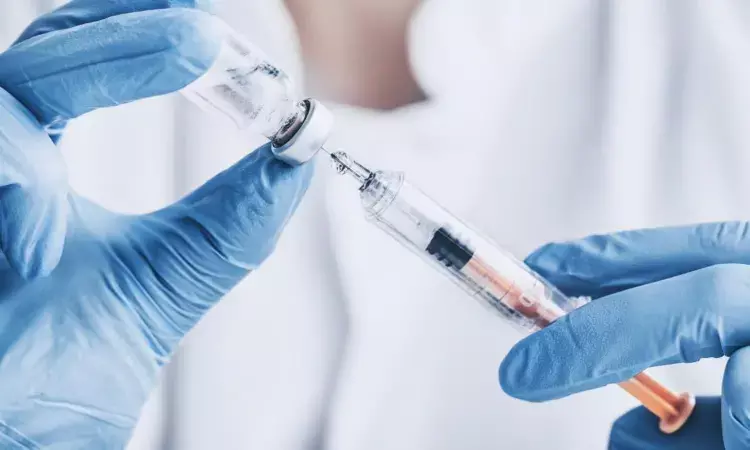- Home
- Medical news & Guidelines
- Anesthesiology
- Cardiology and CTVS
- Critical Care
- Dentistry
- Dermatology
- Diabetes and Endocrinology
- ENT
- Gastroenterology
- Medicine
- Nephrology
- Neurology
- Obstretics-Gynaecology
- Oncology
- Ophthalmology
- Orthopaedics
- Pediatrics-Neonatology
- Psychiatry
- Pulmonology
- Radiology
- Surgery
- Urology
- Laboratory Medicine
- Diet
- Nursing
- Paramedical
- Physiotherapy
- Health news
- Fact Check
- Bone Health Fact Check
- Brain Health Fact Check
- Cancer Related Fact Check
- Child Care Fact Check
- Dental and oral health fact check
- Diabetes and metabolic health fact check
- Diet and Nutrition Fact Check
- Eye and ENT Care Fact Check
- Fitness fact check
- Gut health fact check
- Heart health fact check
- Kidney health fact check
- Medical education fact check
- Men's health fact check
- Respiratory fact check
- Skin and hair care fact check
- Vaccine and Immunization fact check
- Women's health fact check
- AYUSH
- State News
- Andaman and Nicobar Islands
- Andhra Pradesh
- Arunachal Pradesh
- Assam
- Bihar
- Chandigarh
- Chattisgarh
- Dadra and Nagar Haveli
- Daman and Diu
- Delhi
- Goa
- Gujarat
- Haryana
- Himachal Pradesh
- Jammu & Kashmir
- Jharkhand
- Karnataka
- Kerala
- Ladakh
- Lakshadweep
- Madhya Pradesh
- Maharashtra
- Manipur
- Meghalaya
- Mizoram
- Nagaland
- Odisha
- Puducherry
- Punjab
- Rajasthan
- Sikkim
- Tamil Nadu
- Telangana
- Tripura
- Uttar Pradesh
- Uttrakhand
- West Bengal
- Medical Education
- Industry
DROOL procedure for refractory sialorrhoea improves pulmonary inflammation and reduces hospitalizations after surgery in kids: JAMA

USA: DROOL procedure demonstrated a reduction in hospitalizations and an improvement in inflammation after surgery among patients with impaired secretion management, a recent study published in JAMA Otolaryngology–Head & Neck Surgery has shown.
In the case series of 112 patients with refractory sialorrhea, there was a significant reduction in the median polymorphonuclear neutrophil percentage in bronchoalveolar lavage samples from 65.0% preoperatively to 32.5% postoperatively over 10 years. Patient caregivers also reported reduced annual hospitalizations and improved global function after surgery.
Refractory sialorrhea in children can lead to irreversible lung damage and pulmonary aspiration. There is a lack of data on objective outcome measures, especially about pulmonary health, despite many studies devoted to surgical treatment of sialorrhea. Ashley L. Miller, Cincinnati Children’s Hospital Medical Center, Cincinnati, Ohio, and colleagues aimed to determine whether bilateral submandibular gland excision and bilateral parotid duct ligation (“DROOL” procedure) reduces pulmonary inflammation in bronchoalveolar lavage (BAL) samples after surgery. They also evaluated patient factors associated with improvement after surgery in a retrospective case series.
The study included 112 patients undergoing the DROOL procedure at a single tertiary care pediatric children’s hospital from 2012 to 2021. The main outcomes included the degree of pulmonary inflammation (neutrophil percentage) according to BAL cytologic findings and overall bronchoscopy findings up to 12 months before and after the DROOL procedure. Secondary outcomes included caregiver reports of function before and after the procedure, several annual hospitalizations, and the need for additional operations and/or revision procedures for secretion management.
The study led to the following findings:
- 112 patients (median age, 3.4 years; 58.0% boys) underwent DROOL procedures and had both preoperative and postoperative BAL samples during the study period.
- Patients demonstrated objective improvement in pulmonary inflammation after surgery, with the median polymorphonuclear neutrophil percentage decreasing from 65.0% before the surgery to 32.5% after the surgery.
- Before the DROOL procedure, 30.4% of patients were hospitalized 2 or more times annually for respiratory illness, which decreased to 10.1% after surgery (3 patients did not have hospitalization data available following surgery).
- Most caretakers (65.2%) reported improved secretion management after the procedure.
"Overall, the findings of the case series suggest that the DROOL procedure is an effective and safe surgical therapy for refractory sialorrhea, which results in both subjective improvement in quality of life and secretion management as well as objective improvement in inflammation and pulmonary health for most patients," the researchers wrote.
"Our findings may help to inform preoperative counselling of sialorrhea patients and concern for pulmonary aspiration," they concluded. "Additional research is necessary to guide patient selection and optimal timing for this procedure."
Reference:
Miller AL, Hysinger EB, Tabangin ME, Torres-Silva C, de Alarcon A, Hart CK. Pulmonary and Clinical Outcomes After Bilateral Submandibular Gland Excision and Parotid Duct Ligation for Refractory Sialorrhea. JAMA Otolaryngol Head Neck Surg. Published online November 22, 2023. doi:10.1001/jamaoto.2023.3670
Dr Kamal Kant Kohli-MBBS, DTCD- a chest specialist with more than 30 years of practice and a flair for writing clinical articles, Dr Kamal Kant Kohli joined Medical Dialogues as a Chief Editor of Medical News. Besides writing articles, as an editor, he proofreads and verifies all the medical content published on Medical Dialogues including those coming from journals, studies,medical conferences,guidelines etc. Email: drkohli@medicaldialogues.in. Contact no. 011-43720751


